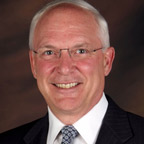Communication Driving Cultural Transformation

A word that might best describe Proctor Hospital during 2009 would be change. Despite this year’s economic challenges, it was critical that we moved forward to implement a strategic plan to achieve our goals, including a new mission, vision and values. Every level of the organization participated, including employees, physicians, volunteers, board members and community leaders. Facing both economic and organizational change, communication was key to our success.
Communication is at the heart of all we do. Its value is too significant to dismiss. Its reward is…success. Harvard Business School Professor John Kotter said it best: “Without credible communication, and a lot of it, the hearts and minds of the troops are never captured.”
Encouraging transparency has helped to dismantle “silos” and stimulate teamwork, empower employees, build trust, encourage ideas, improve processes and eliminate waste.
Employees often resist change because they have no idea why they are being asked to change. Listening and answering the tough questions provides them the vision and understanding to embrace these initiatives. It is just as important to recognize individuals for their leadership along the way. They have a tremendous effect on the spirit of the organization, uplifting co-workers and helping to provide memorable, unmatched experiences for our patients and their families.
Through quarterly employee town hall meetings, weekly “stand-up” meetings for managers, department visits, almost-daily meetings with staff and volunteers, and those critical one-on-one visits in the hallway or parking lot, I have discovered employee-leaders at every level. And I am reminded that our employees are continuously looking at leadership’s personal commitment to change. Do we “walk the talk”? Do they see a confidence in us and where “we” are going?
Fostering an environment of change through communication builds trust. As providers of patient care, trust and accountability are critical. How critical? A 2006 poll conducted by the Kaiser Family Foundation states that “nearly half the public say they are very concerned about an injury happening to themselves or their family when they receive health care in general (47%) and when they go to a hospital for care (47%).”
Although quality and safety have always been a priority at Proctor, we are even more committed to these issues. Individuals at every level are working with organizations like Quality Quest for Health of Illinois; engaged in safety collaboratives with the Illinois Hospital Association and other organizations; and participating in research studies, national patient safety goals, core measures, best practices, and 6 Sigma.
I’m proud of everyone at Proctor, especially our employees, for their commitment to our new mission, vision, values and all we’ve accomplished so far—helping to change our culture and provide a safer, compassionate environment for our patients. iBi

